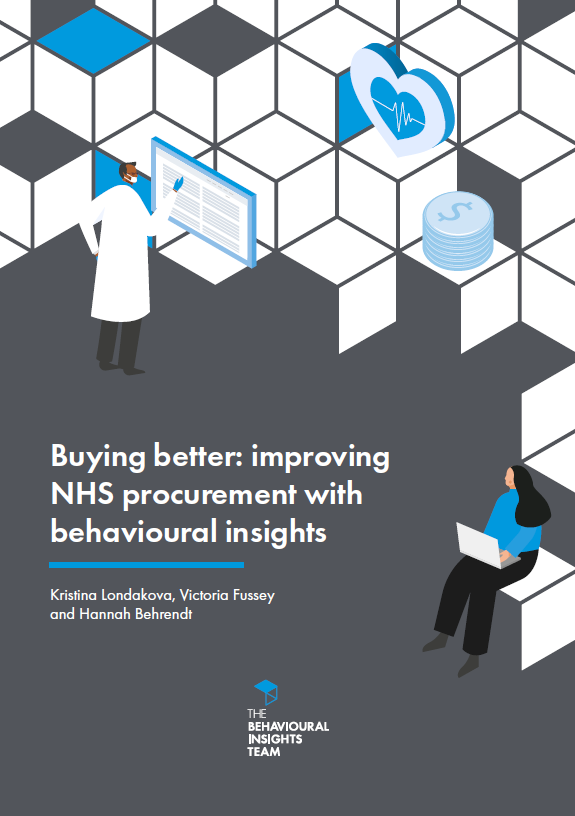Digital health technologies, including health apps, have the potential to revolutionise healthcare delivery in the UK by improving patient outcomes, reducing costs, increasing efficiency, and making healthcare more accessible. For health apps to be effective, they must be designed with an understanding of human behaviour so that the digital services, offered by apps or online, are easy to use, embedded in the wider system for scale, such that service users – be they clinicians, patients or administrative staff – use them as intended. At BIT, we are proposing three ways in which we think behavioural science can make health apps more effective:
- Making sure health apps work for the needs of service users
- Widening the reach of these solutions by testing what comms works best, for whom
- Evaluating apps to ensure they deliver their intended objective/s
Why is digital health important?
Digital health solutions, including health apps, are becoming increasingly important in healthcare services. The recent Labour Mission highlighted their vision for more digital health solutions in the NHS, such as making the NHS App the single front door to all NHS services. Digital health solutions are technology-based applications that are used to improve healthcare outcomes. This includes (but is not limited to): electronic health records, mobile health apps, telemedicine and wearable devices.
Similarly, digital health solutions play a key role in the NHS Long Term Plan‘s vision for the future of healthcare delivery in the UK. The NHS Long Term Plan recognises the importance of digital transformation, and outlines a ten-year strategy for transforming the NHS. One of the key aims of the plan is to ensure that all patients have access to digital healthcare services, such as online consultations and remote monitoring, by 2024. The plan also aims to introduce electronic patient records across the NHS by 2024, enabling healthcare professionals to access patient information more easily and quickly.
What is the problem?
However, simply introducing digital health solutions is not enough to ensure their successful adoption and usage by healthcare professionals and patients. This is where behavioural science comes in. Behavioural science is the study of human behaviour, and how it can be influenced by various factors such as social norms, cognitive biases and decision-making processes. By applying insights from behavioural science, digital health solutions can be designed and implemented in a way that maximises their adoption and usage.
For example, there are a number of online health and prescription services that allow patients to arrange appointments with their GP and order repeat prescriptions through an app. However, patients’ experiences of digital NHS access are often clunky and fragmented, and uptake of digital options for ordering repeat prescriptions and booking appointments in primary care remains low despite the functionality being widely available.
Successful digital solutions have proven to be a game-changer in the healthcare industry. Not only can they improve the overall patient experience, but they can also reduce healthcare costs. For example, The Electronic Prescription Service (EPS), which is used in 93% of England’s 7,300 GP practices, saved the NHS £136 million between 2013 and 2016. Another successful digital solution is the NHS e-referral service, which now covers every hospital and GP practice and saves the NHS over £50 million annually.
However, it’s not just large-scale digital solutions that are making an impact. Smaller solutions, if implemented nationally, can also make a significant difference. In 2018, a maternity app was launched at an NHS trust, which provided real-time access to maternity records for patients. This solution received very positive feedback, and it was estimated it could potentially save the trust over 400 hours in staff time a year. Extrapolated across the entire UK, this solution could translate into approximately £2 million in savings annually.
Our services
To make sure digital health solutions really work, we need to make progress in three key areas. Below we have proposed three specific ways in which BIT can help to make digital health, in particular health apps, more impactful:
- Behavioural Optimisation: Making sure health apps work for the needs of service users. Many health applications are designed for specific user groups. For instance, there are wearable-integrated apps designed to improve rehabilitation for armed forces personnel with injuries. Similarly, a range of apps, from those focused on mental health provision to those focused on illness detection target a specific demographic. BIT can use behavioural science techniques and user group testing to make sure your apps are best designed to meet users’ needs.
- Expanding Reach: Nailing the comms; what approach works best? The Behavioural Insights Team are experts in behavioural science, and we know that different versions of the same underlying message can perform very differently, and gain very different outcomes. BIT’s online Predictiv platform enables us to test messaging with large numbers of users to identify best performers, for you to include in your products.
- Impact evaluation: Does it deliver its intended objectives? A healthcare app must, at its core, deliver a healthcare benefit. Yet many are unevaluated at best, and at worst, don’t deliver the desired benefit. If the future of healthcare is to change and become more technologically driven, then we must be able to establish, rigorously, whether – and to what extent – an app is achieving its intended outcome.
How can BIT help?
BIT offers bespoke solutions in each of the areas of work highlighted above. We’re excited to collaborate with partner organisations on encouraging the use of digital health and to explore how we can improve health outcomes in this space. By working together, digital health solutions and behavioural science can help to create a healthcare system that is more efficient, effective and patient-centred.
If you would like more information or an initial discussion, please get in touch with Helen Brown or Giulia Tagliaferri. We would be delighted to arrange a meeting and discuss your specific requirements.







